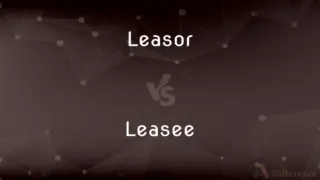Apologise vs. Apologies — What's the Difference?
By Maham Liaqat & Fiza Rafique — Updated on April 7, 2024
"Apologise" is a verb meaning to express regret for wrongdoing, while "apologies" is the plural form of "apology," a noun referring to expressions of regret.

Difference Between Apologise and Apologies
Table of Contents
ADVERTISEMENT
Key Differences
"Apologise" is the action of expressing regret or saying sorry for something wrong that has been done, often used in contexts where one seeks forgiveness. Whereas "apologies" refers to the statements or expressions made when someone apologizes. It represents the physical or verbal expressions of regret over some action or statement.
While "apologise" involves the act of seeking forgiveness, "apologies" focuses on the content or form of the expression of regret. For example, one might "apologise" for a mistake by offering "apologies" to those affected. This distinction highlights the difference between the act and the expressions used in the act.
The verb "apologise" is used in situations requiring action—specifically, the action of expressing remorse. On the other hand, "apologies" as a noun is used when referring to the outcome or result of that action, including in formal settings where multiple expressions of regret might be offered.
In practice, "to apologise" is to engage in the process of saying sorry, which involves personal acknowledgment of fault or error. Meanwhile, "apologies" can be shared in various formats, such as written notes, public statements, or verbal acknowledgments, serving as tangible manifestations of the act of apologising.
Understanding the context in which each term should be used is crucial: "apologise" fits when discussing the act of expressing regret, while "apologies" is appropriate when focusing on the expressions or instances of that regret. This distinction helps in accurately conveying messages of remorse and responsibility.
ADVERTISEMENT
Comparison Chart
Definition
The action of expressing regret for a mistake or wrongdoing.
Expressions of regret or statements made when apologizing.
Form
Verb
Noun (plural of "apology")
Usage
To describe the act of seeking forgiveness or expressing regret.
To refer to the actual expressions or statements of regret.
Example Context
"I need to apologise to her for my actions."
"He offered his apologies at the meeting."
Focus
On the action/process of expressing regret.
On the outcome or expressions resulting from apologizing.
Compare with Definitions
Apologise
To acknowledge fault or error in one's actions.
He needed to apologise for the misunderstanding.
Apologies
Formal statements expressing sorrow or remorse.
The apologies were read aloud at the ceremony.
Apologise
To express sorrow or remorse.
They apologised for any inconvenience caused.
Apologies
Acts of acknowledging mistake or fault.
The manager's apologies seemed sincere.
Apologise
To say sorry as a way of seeking forgiveness.
She apologised profusely for the delay.
Apologies
Expressions of regret for wrongdoing.
His apologies were accepted by the team.
Apologise
To express regret for something that one has done wrong.
I must apologise for my earlier mistake.
Apologies
Multiple instances of saying sorry.
After the incident, numerous apologies were offered.
Apologise
To make a formal expression of regret.
The company will apologise to customers affected by the outage.
Apologies
Written or verbal expressions of regret.
She sent apologies for not being able to attend.
Apologise
Standard spelling of apologize
Apologies
An acknowledgment expressing regret or asking pardon for a fault or offense
Please accept my apology for being so late.
Apologise
Same as apologize.
Apologies
A formal justification or defense.
Apologise
Defend, explain, clear away, or make excuses for by reasoning;
Rationalize the child's seemingly crazy behavior
He rationalized his lack of success
Apologies
An explanation or excuse
"The consequence of those measures will be the best apology for my conduct" (Daniel Defoe).
Apologise
Acknowledge faults or shortcomings or failing;
I apologized for being late
He apologized for the many typoes
Apologies
An inferior substitute
The sagging cot was a poor apology for a bed.
Apologies
Plural of apology
Apologies
Plural of apologie
Apologies
A list of people unable to attend a meeting, typically presented as the first item on the agenda.
Apologies
Alternative form of my apologies
Common Curiosities
Is "apologise" always used as a verb?
Yes, "apologise" is always a verb, indicating the action of expressing regret.
How do you know when to use "apologise" vs. "apologies"?
Use "apologise" when referring to the act of expressing regret, and "apologies" when referring to the expressions of regret.
Can "apologies" be used in singular form?
Yes, but in singular form, it becomes "apology," referring to a single expression of regret.
Can "apologies" be used to offer regret directly?
Yes, "apologies" can be used to offer regret directly, especially in formal communications.
Are "apologise" and "apologies" interchangeable?
No, they are not interchangeable; "apologise" is a verb, while "apologies" is a noun.
Does the context affect how "apologise" and "apologies" are used?
Yes, the context, such as formal vs. informal situations, can influence the choice between these terms.
Can both terms be used in a formal apology?
Yes, both can be used: "apologise" to describe the act and "apologies" to refer to the content of the apology.
Is it correct to say "I send my apologies" when you cannot attend an event?
Yes, this is a correct and common use of "apologies" in the context of expressing regret for absence.
How does the sincerity of an apology affect its reception?
The perceived sincerity of an apology, whether verbal ("apologise") or expressed ("apologies"), significantly impacts its acceptance and the healing process.
How do cultural differences impact the use of "apologise" and "apologies"?
Cultural norms can influence the frequency, manner, and context in which apologies are offered and accepted.
Share Your Discovery

Previous Comparison
Sow vs. Saw
Next Comparison
Leasor vs. LeaseeAuthor Spotlight
Written by
Maham LiaqatCo-written by
Fiza RafiqueFiza Rafique is a skilled content writer at AskDifference.com, where she meticulously refines and enhances written pieces. Drawing from her vast editorial expertise, Fiza ensures clarity, accuracy, and precision in every article. Passionate about language, she continually seeks to elevate the quality of content for readers worldwide.














































